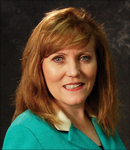For this inaugural column of Powherful Forces, we are pleased to feature Sharon Allan, chief innovation officer of SEPA.
Years ago, after Sharon Allan was named one of the 50 Key Women in Energy by Now magazine, that honor was referenced by a man who introduced her to conference attendees she was about to address. The audience was impressed. Allan told them they needn’t be. “There are only about 50 women in Energy,” she quipped.
Allan can make such jokes because she’s been an industry player for decades, and she recalls the days when fewer women chose to major in engineering, as she did.
Despite being a rarity in the industry, Allan also has been a leader. She was president of a large advanced metering infrastructure (AMI) vendor, headed the smart grid group for Accenture and was CEO for the Smart Grid Interoperability Panel (SGIP). Under Allan’s leadership, SGIP merged with the Smart Electric Power Alliance (SEPA), and she now serves as that organization’s chief innovation officer.
It’s a fitting role because Allan has seen much change in the power sector over the years. Interestingly, she points out that the most significant advancements have taken place fairly recently. “It’s been stated, that the electric grid is the largest interconnected machine on earth and the greatest achievement of the 20th Century, but it is really the emergence of IoT, which began around 2000, that has led to increased connectivity in the utility space,” she says.
Today, IoT has a tremendous impact on grid operations and resilience. But before there was IoT, there was AMI, which Allan sees as a foundational technology because it made two-way communications and control a widespread capability. According to Allan, “Had AMI not been rolled out a little more than 10 years ago, we would not have the proliferation and rise in popularity of solar. We would not have the technology in place to support net metering or management of microgrids.”
Allan also points to mobile apps as a technological advancement that has completely changed the way utilities interact with their customers. Today’s consumers want to be in greater control of how and when they use energy. “Customers are now buying their own appliances and automating their home needs, including remotely controlling their energy consumption,” says Allan. “This unprecedented consumer involvement is shaping our industry from the proliferation of DERs to innovative technologies of the future.”
One area where Allan sees there remains a great need for improvement is within the grid itself. With what appears to be an increasing number of major storms we’ve seen in North America, Allan believes it is critical that more effort is made to shore up the grid so it can survive and quickly recover from such devastation in the future.
While technological advances will continue to shape the future of utilities, humans will be the ones managing the industry transformation. Recognizing the importance of bringing together stakeholders whose collective intelligence can come up with the best solutions to the most complex problems, Allan established working groups while she was the CEO for SGIP. These working groups now exist under the SEPA, and they are considered core to the organization.
“We are there on the ground with utility engineers and managers, helping them shape their strategy, guiding them along the way as they work to achieve their vision,” Allan says.
She strives to engender collaboration among the utilities, the business community, and government entities. This collaboration is something about which Allan is passionate, and she sees SEPA as a platform that allows that collaboration to happen.
Specifically, there are now 13 working groups, and each aligns around a particular topic like grid architecture, grid management, EV’s, energy storage, and cybersecurity. Each group averages at least 50 members, but some have more than 100.
The exchange of ideas and collaboration among working group members benefits the organizations each member represents, but their activities extend beyond case studies. Often, such groups generate outputs that influence the industry. For example, at DistribuTECH 2016, SEPA’s utility-only Grid Management Working Group held a meeting to discuss requirements for distributed energy resources management systems (DERMS). The effort to create a requirements document for DERMS grew out of a joint effort between the utilities-only working group, Southern California Edison, Duke Energy and ComEd.
Now available for industry comment at www.dermsterms.com, SEPA’s Distributed Energy Resources Management Systems (DERMS) Requirements document was crafted to help utilities reduce risks of procuring systems that failed to deliver all needed capabilities and to inform and guide industry vendors in their own product development efforts.
Another working group (Distributed Resources Generation Storage – DRGS) generated the requirements that went into what today is IEEE 1547, the standard that defines how distributed energy resources connect to the grid. This was done under the organization’s priority action plan process and the work is known as PAP (priority action plan).
Allan’s role will continue to evolve as she works with SEPA to support its stakeholders and help them navigate the ever-changing industry landscape — especially concerning DERs. “This industry, like all industries, will continue to change,” says Allan.
“Our centralized grids have existed for a number of years, yet we face a lot of change and evolution as we see new distributed energy resources get integrated. And this change is really where SEPA is focused. My role at SEPA will help accelerate that innovation curve, whether it’s innovation of technology, of policy, of tools and models, or of business processes, in order to ensure a smooth transition into the next stage of our industry.”
 Sharon Allan has more than 30 years of experience and is an executive known for business transformation and growth. She was CEO of SGIP, which merged with SEPA in 2017. She is also on the advisory board of Enertech Capital. Previously, she was managing director of Accenture’s Smart Grid Practice. Other industry roles include president of Elster Integrated Solutions, chief knowledge officer of Elster Electricity, as well as executive roles at ABB, and IBM. Allan has been recognized throughout the years as a Pioneer by Smart Grid Today, Mover and Shaker by GTM (Greentech Media), Top 3 by Smart Grid News, Technology Leader by NCCBI, Platts Energy, and a “Class of 2007 and Alumni” leader by World Generation. Allan is an honors graduate of the University of Florida with a Bachelor’s of Science in electrical engineering and holds an MBA from Duke’s Fuqua Business School.
Sharon Allan has more than 30 years of experience and is an executive known for business transformation and growth. She was CEO of SGIP, which merged with SEPA in 2017. She is also on the advisory board of Enertech Capital. Previously, she was managing director of Accenture’s Smart Grid Practice. Other industry roles include president of Elster Integrated Solutions, chief knowledge officer of Elster Electricity, as well as executive roles at ABB, and IBM. Allan has been recognized throughout the years as a Pioneer by Smart Grid Today, Mover and Shaker by GTM (Greentech Media), Top 3 by Smart Grid News, Technology Leader by NCCBI, Platts Energy, and a “Class of 2007 and Alumni” leader by World Generation. Allan is an honors graduate of the University of Florida with a Bachelor’s of Science in electrical engineering and holds an MBA from Duke’s Fuqua Business School.








